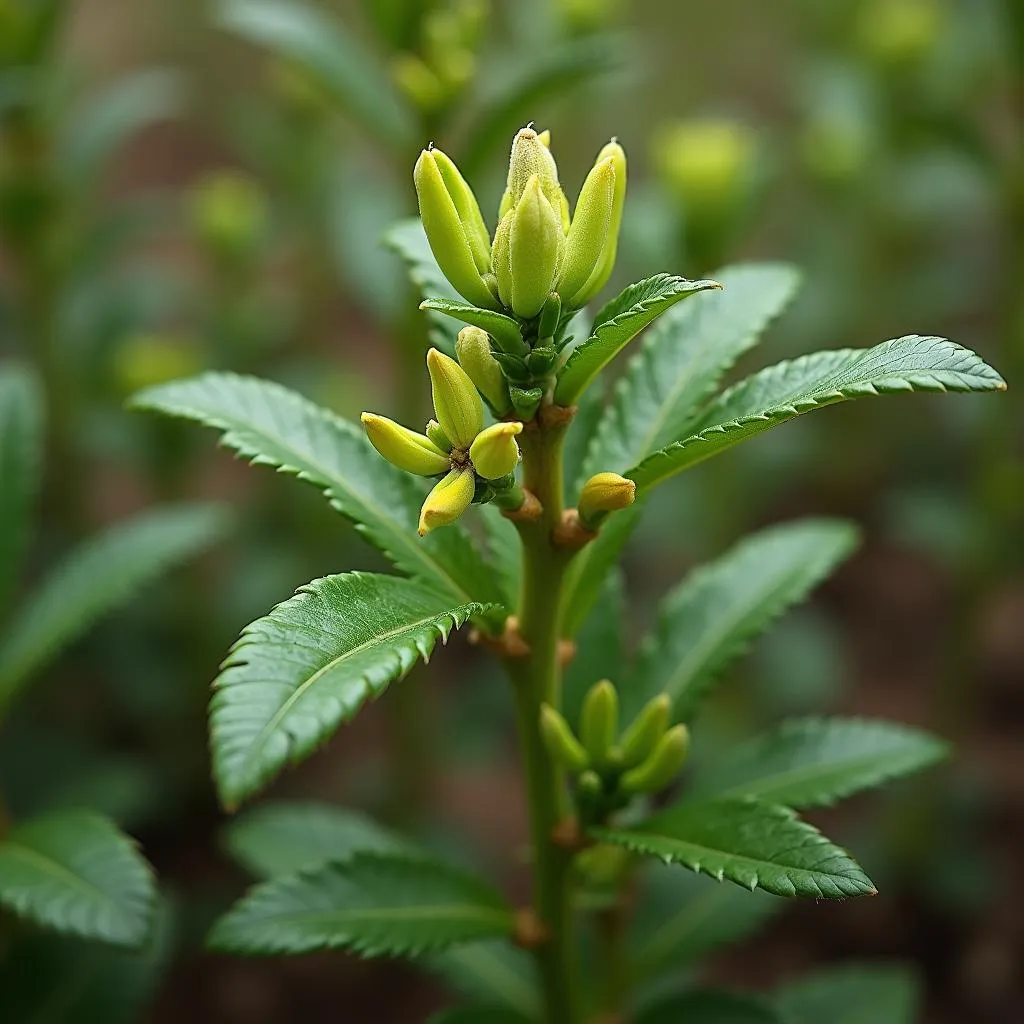Unveiling the Secrets of African Bush Pepper: Spice, Flavor, and Tradition
African Bush Pepper, also known as Uda (Igbo) or Masoro (Yoruba), holds a prominent place in West African cuisine and traditional medicine. This spice, with its distinct aroma and pungent flavor, adds a unique depth to dishes while offering a range of potential health benefits. Let’s delve into the fascinating world of African bush pepper, exploring its culinary uses, cultural significance, and the science behind its purported properties.
What is African Bush Pepper?
African bush pepper comes from a climbing shrub native to West Africa. Its scientific name is Xylopia aethiopica. Though referred to as pepper, it is not related to black pepper (Piper nigrum) but belongs to the Annonaceae family, which also includes custard apple and soursop.
 African Bush Pepper Plant Growing in the Wild
African Bush Pepper Plant Growing in the Wild
The spice itself is derived from the dried, brown, pod-shaped fruits of the plant. These pods, about 2-5cm long, contain small, black seeds that carry the potent flavor African bush pepper is known for.
Culinary Uses of African Bush Pepper
African bush pepper is a staple in many West African dishes, particularly in Nigerian cuisine. Its unique flavor profile, often described as a blend of nutmeg, cardamom, and black pepper with hints of citrus, adds warmth and complexity to a wide array of dishes.
- Soups and Stews: African bush pepper is frequently used in hearty soups and stews, especially those featuring meat or fish. It adds a depth of flavor and a subtle heat that enhances the overall taste.
- Marinades and Rubs: The spice’s strong aroma and flavor make it ideal for marinades and rubs, particularly for grilled or roasted meats. It helps to tenderize the meat while infusing it with a unique, earthy flavor.
- Spice Blends: African bush pepper is a key ingredient in various West African spice blends, such as suya pepper, which is used to season grilled meats. These blends typically include a combination of spices like ginger, garlic, chili peppers, and groundnuts.
 Preparing African Bush Pepper for Cooking
Preparing African Bush Pepper for Cooking
Expert Insight: “The use of African bush pepper in West African cuisine extends beyond just flavor,” says Chef Abena Osei, a renowned Ghanaian chef specializing in traditional West African dishes. “It’s about creating a sensory experience that embodies the warmth and richness of our culinary heritage.”
Beyond the Kitchen: Traditional Uses of African Bush Pepper
African bush pepper’s significance extends far beyond the culinary realm. For centuries, it has been an integral part of traditional medicine practices in West Africa.
- Postpartum Care: Traditionally, African bush pepper is believed to aid postpartum recovery. New mothers often consume soups or teas infused with the spice to help with uterine contractions, reduce bloating, and promote overall healing.
- Digestive Aid: The spice is also used to alleviate digestive discomfort. Its carminative properties are thought to help reduce gas and bloating, while its antimicrobial properties may help fight off harmful bacteria in the gut.
- Respiratory Relief: In traditional medicine, African bush pepper is used to treat respiratory ailments like coughs, colds, and bronchitis. It is believed to act as an expectorant, helping to clear congestion in the airways.
Expert Insight: “While scientific research on the medicinal properties of African bush pepper is still ongoing,” notes Dr. Kwame Mensah, a renowned ethnobotanist specializing in West African medicinal plants, “its long history of use in traditional medicine suggests potential therapeutic benefits that warrant further investigation.”
African Bush Pepper in a Globalized World
As global interest in African cuisine and traditional remedies grows, so does the popularity of African bush pepper. The spice is becoming more readily available in specialty stores and online, allowing people worldwide to experience its unique flavor and potential health benefits.
FAQs About African Bush Pepper
1. What does African bush pepper taste like?
African bush pepper has a warm, slightly bitter, and pungent flavor reminiscent of nutmeg, cardamom, and black pepper, with subtle citrus notes.
2. How is African bush pepper used in cooking?
It’s commonly used in soups, stews, marinades, rubs, and spice blends. It pairs well with meat, fish, and vegetables.
3. What are the potential health benefits of African bush pepper?
Traditionally, it’s used to aid postpartum recovery, improve digestion, and relieve respiratory issues. However, more research is needed to confirm these benefits scientifically.
Exploring the Diverse Flavors of Africa
African bush pepper is just one example of the incredible diversity and richness of African cuisine. From fragrant spices to exotic fruits and vegetables, the continent offers a world of culinary treasures waiting to be discovered. Explore further with these related articles:
Conclusion
African bush pepper, a staple in West African cuisine and traditional medicine, embodies the continent’s rich culinary and cultural heritage. Its distinct flavor profile and potential health benefits make it a fascinating spice worth exploring. As you embark on your culinary adventures, consider incorporating African bush pepper into your dishes to experience its unique flavor and the warmth of African culinary traditions.
Should you require further assistance, please feel free to reach us at +255768904061 or kaka.mag@gmail.com. You can also visit our office located at Mbarali DC Mawindi, Kangaga, Tanzania. Our customer service team is available 24/7 to help.


